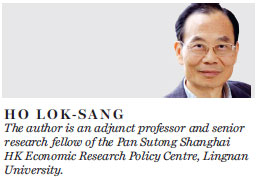Radicals marginalize themselves
Updated: 2016-02-16 09:53
By Ho Lok-Sang(HK Edition)
|
|||||||
Ho Lok-sang writes that young people must urgently abandon violent and radical behavior in favor of moderate and rational means if they want to build a better society
One frequent complaint among some young people is that they are marginalized, that they are sidelined by adults who make decisions which they often disagree with. Some of them complain about gerontocracy - or rule by older people - in Hong Kong. They want anyone over 60 to stay out of politics. Some say that young people at 18 should be eligible to run for a seat in the Legislative Council (the current age limit is 21). They want more say in university councils and a larger role in selecting university presidents. They detest the arrangements laid down in the Basic Law which propose having a Nominating Committee to vet candidates for the post of Chief Executive. They want to set their own rules rather than accept those set by other people. They are angry because those who have the power to make decisions do not accede to their demands.
The paradox is that people who think they are marginalized and protest to try to obtain their "rights" by antisocial acts are actually marginalizing themselves. They may never get out of this rut. To do so, they need to reinvent themselves through positive behavior which will win the respect and support of other people. But they can never win acceptance from other people with antisocial behavior.
Antisocial behavior will be deeply reviled by most people in society. Behavior like physically attacking the police, throwing bricks at people or at property, starting fires, vandalism and so on will never win the approval of mainstream society - no matter how much the perpetrators try to justify their actions. People who participated in the Mong Kok riot are definitely marginalizing themselves. They may be condemning themselves to become permanent social outcasts.
I have always encouraged students to engage in the community. I certainly benefited at least as much outside the classroom as inside when I was a student. I was a member of the current affairs committee of the student union and publications secretary for the Social Science Society. I also served as a reporter for the student union paper Undergrad. Publications secretary was a very busy job because I was in charge of editing a bi-monthly publication called The Voice and an annual student journal called The Social Scientist. While a graduate student at the University of Toronto I was elected president of the Chinese Students Association. I also took up voluntary work such as delivering meals to the elderly and teaching Chinese children in the WoodGreen Community Centre. I have long held "Everywhere I go, I make it my home" as my motto, meaning that no matter where I live, I engage in and contribute to the community.
University to me is like a "treasure mountain". I wanted to take in as much intellectual food as possible from my professors and from the well-endowed university libraries. University governance certainly was no better than today, and certainly not as open. Yet students then did not consider this to be a problem at all. There was enough to keep us busy, and few felt marginalized.
Apart from feeling marginalized because young people are not given a bigger decision-making role in university or community affairs, young people today are also frustrated because upward mobility is widely believed to be not as easy as it was previously. The fact is that every generation has its advantages and disadvantages. Compared with past generations, our younger generation is actually quite privileged. Today practically everyone can finish high school, and many more young people can get into university. Most families during my time did not even have a television set, and an air-conditioner or a refrigerator were certainly luxury items that only the very rich could own. Recreational facilities and community amenities today are vastly better than those available then. There was no MTR, and buses were crowded and not air-conditioned. There were fewer public libraries and they were far less well-endowed. Today, our younger generation also has access to the Internet and the many opportunities that it brings.
Being concerned about issues and trying to fight for social justice is one thing, but fighting for it in a civilized society is not the same as using brute force or violence. Fighting for social justice requires studying the nature of social problems with humility, trying to come up with viable solutions and constantly improving them, engaging in policy debates, being open to other people's arguments, and winning the support of people. "Social engineering" is an eternal task. There will always be flaws in human institutions, but improvements can be made, and indeed have been made time and again. Compared to what previous generations experienced, today's society is much more just. Social engineering that truly benefits humanity requires patience and hard work.
Violence deviates from Hong Kong's core values, and perpetrators of violence will only marginalize themselves. If the "localists" really love Hong Kong, they must abandon violence and extremism and concentrate on doing things which serve Hong Kong's best interests.

(HK Edition 02/16/2016 page10)